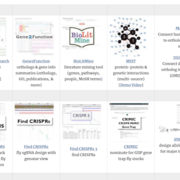
The DRSC bioinformatics team, led by Dr. Claire Yanhui Hu, has recently published two new papers.
One reports development of BioLitMine, an advanced literature mining resource. The other provides an overview of our online resources, which can be grouped into reagent, gene, and data-focused resources.
As a supplement to these publications, we have also added new demo videos at the DRSC YouTube channel.
Nucleic Acids Res. 2020 Oct 26
FlyRNAi.org-the database of the Drosophila RNAi screening center and transgenic RNAi project: 2021 update.
Hu Y(, Comjean A, Rodiger J, Liu Y, Gao Y, Chung V, Zirin J, Perrimon N, Mohr SE.
Abstract: The FlyRNAi database at the Drosophila RNAi Screening Center and Transgenic RNAi Project (DRSC/TRiP) provides a suite of online resources that facilitate functional genomics studies with a special emphasis on Drosophila melanogaster. Currently, the database provides: gene-centric resources that facilitate ortholog mapping and mining of information about orthologs in common genetic model species; reagent-centric resources that help researchers identify RNAi and CRISPR sgRNA reagents or designs; and data-centric resources that facilitate visualization and mining of transcriptomics data, protein modification data, protein interactions, and more. Here, we discuss updated and new features that help biological and biomedical researchers efficiently identify, visualize, analyze, and integrate information and data for Drosophila and other species. Together, these resources facilitate multiple steps in functional genomics workflows, from building gene and reagent lists to management, analysis, and integration of data.
DOI: 10.1093/nar/gkaa936
PMID: 33104800
G3. 2020 Oct 7:g3.401775.2020
BioLitMine: Advanced Mining of Biomedical and Biological Literature About Human Genes and Genes from Major Model Organisms.
Hu Y, Chung V, Comjean A, Rodiger J, Nipun F, Perrimon N, Mohr SE.
Abstract: The accumulation of biological and biomedical literature outpaces the ability of most researchers and clinicians to stay abreast of their own immediate fields, let alone a broader range of topics. Although available search tools support identification of relevant literature, finding relevant and key publications is not always straightforward. For example, important publications might be missed in searches with an official gene name due to gene synonyms. Moreover, ambiguity of gene names can result in retrieval of a large number of irrelevant publications. To address these issues and help researchers and physicians quickly identify relevant publications, we developed BioLitMine, an advanced literature mining tool that takes advantage of the medical subject heading (MeSH) index and gene-to-publication annotations already available for PubMed literature. Using BioLitMine, a user can identify what MeSH terms are represented in the set of publications associated with a given gene of the interest, or start with a term and identify relevant publications. Users can also use the tool to find co-cited genes and a build a literature co-citation network. In addition, BioLitMine can help users build a gene list relevant to a MeSH terms, such as a list of genes relevant to "stem cells" or "breast neoplasms." Users can also start with a gene or pathway of interest and identify authors associated with that gene or pathway, a feature that makes it easier to identify experts who might serve as collaborators or reviewers. Altogether, BioLitMine extends the value of PubMed-indexed literature and its existing expert curation by providing a robust and gene-centric approach to retrieval of relevant information.
DOI: 10.1534/g3.120.401775
PMID: 33028629
Both publications are open access. Should you encounter any problems accessing the publications, or are interested in other publications by our group that you cannot access, please get in touch. We would be happy to share PDFs. Reach out by email to DRSC/TRiP-FGR director Dr. S.E. Mohr to make a request.
